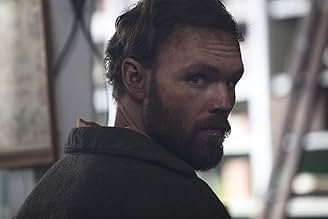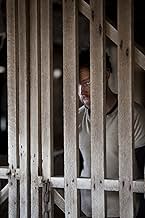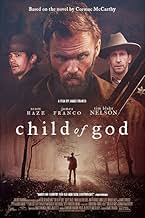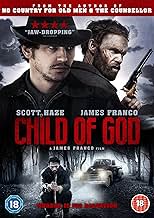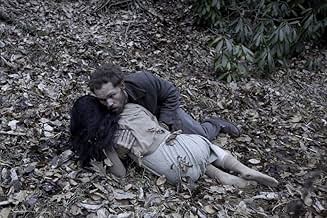NOTE IMDb
5,4/10
4,5 k
MA NOTE
Ajouter une intrigue dans votre langueA dispossessed, violent man's disastrous attempt to exist outside the social order.A dispossessed, violent man's disastrous attempt to exist outside the social order.A dispossessed, violent man's disastrous attempt to exist outside the social order.
- Réalisation
- Scénario
- Casting principal
- Récompenses
- 2 victoires et 1 nomination au total
Ciera Danielle
- Salesgirl
- (as Cierra Parrack)
Avis à la une
Lester Ballard (Scott Haze) is a disturbed man living in the rural mountains of Tennessee in the 60s. His father killed himself and his mother ran away. His father's property is auctioned off and he becomes a recluse. He gets in trouble with Sheriff Fate (Tim Blake Nelson) after he struggled with a drunken woman. He steals and is a general nuisance. He runs across a young couple dead in their car. He has sex with the dead girl and steals her body away.
I think this is the only movie where a character is actually taking a dump. I've got to say that it's disturbing and gross. It sets the tone for the whole movie. Scott Haze is terrific in his performance. The main problem is that the movie is uninvolving. After awhile, Lester's insanity feels repetitive and lifeless. His isolation infiltrates into the movie. This movie needs more time for Sheriff Fate. I also wonder why the sheriff can't put him away longer and how bad the dead body smells. These are the little things that nag at me when the movie stops being compelling. James Franco's directions are workable but they need to energize the plot more.
I think this is the only movie where a character is actually taking a dump. I've got to say that it's disturbing and gross. It sets the tone for the whole movie. Scott Haze is terrific in his performance. The main problem is that the movie is uninvolving. After awhile, Lester's insanity feels repetitive and lifeless. His isolation infiltrates into the movie. This movie needs more time for Sheriff Fate. I also wonder why the sheriff can't put him away longer and how bad the dead body smells. These are the little things that nag at me when the movie stops being compelling. James Franco's directions are workable but they need to energize the plot more.
This film is about a woodsman who is violent and lonesome. He is a disturbed individuals disowned and disliked by the village.
The main character is a man who is wildly different from the other villagers. He cannot relate to other people, and lives in a world of his own. Despite him being a child of God, his behavior becomes increasingly erratic and violent. He's not a character to like, and not just because of his horrid behavior but also of his appearance. I guess "Child of God" is a good film because it evokes a reaction in the mind of viewers, and provoke thoughts on how a person can descend to such lowly depths. It's not a film to like, but to admire for its artistic achievements.
The main character is a man who is wildly different from the other villagers. He cannot relate to other people, and lives in a world of his own. Despite him being a child of God, his behavior becomes increasingly erratic and violent. He's not a character to like, and not just because of his horrid behavior but also of his appearance. I guess "Child of God" is a good film because it evokes a reaction in the mind of viewers, and provoke thoughts on how a person can descend to such lowly depths. It's not a film to like, but to admire for its artistic achievements.
Scott Haze's performance as Lester Ballad is remarkable, but this film is simply depressing--unless that is, your idea of entertainment is spending 100 minutes watching a man of limited intelligence spiral into insanity after his farm is sold out from under him.
I thought my neighbour was a slightly mad, uncouth and antisocial individual, and he sounds a lot like Ballard, so maybe he's a distant relative.
I thought my neighbour was a slightly mad, uncouth and antisocial individual, and he sounds a lot like Ballard, so maybe he's a distant relative.
For those who've not yet partaken in the depraved and deranged dealings of Cormac McCarthy's 1973 book Child of God you are in for one almighty shock if you by chance stumble upon this new James Franco directed effort, a tale that is utterly original in all its triumphs and shortcomings and a tale that deals with some seriously tricky business that on page seemed almost too much to ever commit to screen but thanks to an obvious commitment to the text by Franco the film works to a level that marks the event as an oddity not unworthy of seeking out.
Franco who has long held affiliation with a desire to transform McCarthy's more insane and often controversial works to screen here goes for much of the same aesthetic he created in his last directional outing As I Lay Dying, a low budget yet gritty feel that uses it's natural surrounds to good effect and gives off the illusion of a bigger project. Franco harbors a good feel for not only Lester Ballard the creation but also his world, the feel of the lonely mountains and the people that inhabit them is captured to great effect and visions so vividly written in the book are bought to life here in many respects. With the world captured so foreign too many of us, Franco in the form of actor Scott Haze has found someone that against all odds is Lester Ballard and leads the story of insanity forward.
Without spoiling the character for those uninitiated, Lester Ballard is a thoroughly despicable and complex creation, a man who despite clearly not being of sane mind is also a man who knows better than the acts he commits. Haze owns this "child of god" from small mannerisms through to out and out rage, from random lonely road discoveries to questionable hair and makeup, Haze gets Lester right. Haze is the focus point of the picture with only small appearances by Tim Blake Nelson and Franco himself it's clear that this film is built by Haze but there is only so far his performance can carry a picture that in the end is dealing with material mighty hard to not only relate to but to tolerate and it's a commendable feat to the filmmakers that you won't be reaching for the off switch a mere 30 minutes in for make no doubt about it there are mightily tough and mature themes the film deals with.
Child of God is a film you feel will slowly be discovered by an unknowing audience who will react strongly either way in favour or hatred to a tale that provides no reason for things being the way they are. For those who are familiar with the text this is a very strong attempt at turning an almost un-filmable book into a quality film and as it stands is another fine turn by Franco as a director in what is shaping up to be an interesting career behind the camera.
3 conniving stuffed toys out of 5
Franco who has long held affiliation with a desire to transform McCarthy's more insane and often controversial works to screen here goes for much of the same aesthetic he created in his last directional outing As I Lay Dying, a low budget yet gritty feel that uses it's natural surrounds to good effect and gives off the illusion of a bigger project. Franco harbors a good feel for not only Lester Ballard the creation but also his world, the feel of the lonely mountains and the people that inhabit them is captured to great effect and visions so vividly written in the book are bought to life here in many respects. With the world captured so foreign too many of us, Franco in the form of actor Scott Haze has found someone that against all odds is Lester Ballard and leads the story of insanity forward.
Without spoiling the character for those uninitiated, Lester Ballard is a thoroughly despicable and complex creation, a man who despite clearly not being of sane mind is also a man who knows better than the acts he commits. Haze owns this "child of god" from small mannerisms through to out and out rage, from random lonely road discoveries to questionable hair and makeup, Haze gets Lester right. Haze is the focus point of the picture with only small appearances by Tim Blake Nelson and Franco himself it's clear that this film is built by Haze but there is only so far his performance can carry a picture that in the end is dealing with material mighty hard to not only relate to but to tolerate and it's a commendable feat to the filmmakers that you won't be reaching for the off switch a mere 30 minutes in for make no doubt about it there are mightily tough and mature themes the film deals with.
Child of God is a film you feel will slowly be discovered by an unknowing audience who will react strongly either way in favour or hatred to a tale that provides no reason for things being the way they are. For those who are familiar with the text this is a very strong attempt at turning an almost un-filmable book into a quality film and as it stands is another fine turn by Franco as a director in what is shaping up to be an interesting career behind the camera.
3 conniving stuffed toys out of 5
I sat still after the United States premiere of James Franco's "Child of God" at the New York Film Festival, not as much contemplating whether or not it was good as I was considering whether or not I liked it. Mostly true to the Cormac McCarthy novel on which it was based, the film follows the cloistered and violent existence of Lester Ballard (Scott Haze) who lives isolated in the woods of Tennessee committing crimes of the most grotesque caliber. I won't say much more about the plot other than the fact that the sadistic actions shown on screen evoke an uneasy humor, a disturbing essence of comical brutality. To say the least, this movie is not for the queasy or the fainthearted. You will squirm.
Organization:
James Franco decided to organize the film into three acts, clearly distinguished from one another by title cards. While the producer argued this was done to manifest the passage of time, I felt it had no such effect. To add to this distortion of time and space, scenes are executed as vignettes. There's a constant transition fading in and out of the action, not only prompting confusion as to how much time passes between each scene, but also distracting the audience from the plot by means of excessive filmmaking. Some scenes exist solely for the purpose of character development while others seem to have no function at all. The relevant vignettes are strung together by a consistently distressed brain. While this structure may detract from the linear storyline, it instead leaves more up to interpretation and imagination. No number of scenes can embody the true insanity of Lester Ballard, we can only imagine what madness must be going on between the fades.
Performances:
Scott Haze's performance as Lester Ballard is probably the most memorable and noteworthy aspect of the film. Haze, who lived alone in caves and lost 45 pounds to prepare for this dynamic and challenging role, brilliantly expresses the complex lunacy of Ballard. He adjusted his voice to a barely comprehensible Tennessee accent and habitually licks his lips and bares his teeth, similar to Heath Ledger's Joker. Admitting that he channeled troubles from his own past when confronting the character, Haze often appears ignorant and childlike, constantly screaming and salivating, a repulsive portrait of a man bore from nature's womb. While sometimes funny, his interactions with his victims are unsettling yet strangely amorous. Just like in the writing of Cormac McCarthy, the audience lacks any sympathy for Ballard, for it's nearly impossible to relate to him. Franco isn't looking for your sympathy, he wants nothing more than your intrigue and attention. To witness Haze is to observe an animal, wild, vicious, and savage. The only other notable performance is that of Tim Blake Nelson playing Sheriff Fate. He conducted the role with a mediated honesty, constructing as realistic a character as possible and standing out within the frame, even with minimal screen time.
Technicalities:
All things considered, the technical aspects of the film are quite impressive. Funded out of James Franco's own pocket, the movie looks and sounds great considering its modest budget. The cinematography of the rural Tennessee landscape is eerily beautiful, shot hand-held on a handful of Canon 5Ds. The desaturated and gritty colors add an appropriate rustic feel to the film, further enhancing the forest terrain. The original music, although not particularly memorable, suits the setting well. Furthermore, the nameless narration was true to McCarthy's technique and certainly added to the tone of the film, keeping the audience attentive all the same. Overall, the movie's unsensational filmmaking is entirely fitting, ensuring the horrors on screen are ever more explicit, ever more real.
Conclusion:
You can tame the land, but you can't tame a man. "Child of God" is a commentary about the dispossessed in an incestuous homeland. Littered with existential imagery and dialogue, the film offers a respectful and honest rendering of the novel. While I may not agree with some storytelling elements and approaches, Franco still manages to get the point across and deliver a message, a testament to rejection, violence, and humanity. The film is definitely worth a watch if you can stomach it and works as a cogent visual supplement to the novel. I look forward to seeing more James Franco adaptations in the future.
Organization:
James Franco decided to organize the film into three acts, clearly distinguished from one another by title cards. While the producer argued this was done to manifest the passage of time, I felt it had no such effect. To add to this distortion of time and space, scenes are executed as vignettes. There's a constant transition fading in and out of the action, not only prompting confusion as to how much time passes between each scene, but also distracting the audience from the plot by means of excessive filmmaking. Some scenes exist solely for the purpose of character development while others seem to have no function at all. The relevant vignettes are strung together by a consistently distressed brain. While this structure may detract from the linear storyline, it instead leaves more up to interpretation and imagination. No number of scenes can embody the true insanity of Lester Ballard, we can only imagine what madness must be going on between the fades.
Performances:
Scott Haze's performance as Lester Ballard is probably the most memorable and noteworthy aspect of the film. Haze, who lived alone in caves and lost 45 pounds to prepare for this dynamic and challenging role, brilliantly expresses the complex lunacy of Ballard. He adjusted his voice to a barely comprehensible Tennessee accent and habitually licks his lips and bares his teeth, similar to Heath Ledger's Joker. Admitting that he channeled troubles from his own past when confronting the character, Haze often appears ignorant and childlike, constantly screaming and salivating, a repulsive portrait of a man bore from nature's womb. While sometimes funny, his interactions with his victims are unsettling yet strangely amorous. Just like in the writing of Cormac McCarthy, the audience lacks any sympathy for Ballard, for it's nearly impossible to relate to him. Franco isn't looking for your sympathy, he wants nothing more than your intrigue and attention. To witness Haze is to observe an animal, wild, vicious, and savage. The only other notable performance is that of Tim Blake Nelson playing Sheriff Fate. He conducted the role with a mediated honesty, constructing as realistic a character as possible and standing out within the frame, even with minimal screen time.
Technicalities:
All things considered, the technical aspects of the film are quite impressive. Funded out of James Franco's own pocket, the movie looks and sounds great considering its modest budget. The cinematography of the rural Tennessee landscape is eerily beautiful, shot hand-held on a handful of Canon 5Ds. The desaturated and gritty colors add an appropriate rustic feel to the film, further enhancing the forest terrain. The original music, although not particularly memorable, suits the setting well. Furthermore, the nameless narration was true to McCarthy's technique and certainly added to the tone of the film, keeping the audience attentive all the same. Overall, the movie's unsensational filmmaking is entirely fitting, ensuring the horrors on screen are ever more explicit, ever more real.
Conclusion:
You can tame the land, but you can't tame a man. "Child of God" is a commentary about the dispossessed in an incestuous homeland. Littered with existential imagery and dialogue, the film offers a respectful and honest rendering of the novel. While I may not agree with some storytelling elements and approaches, Franco still manages to get the point across and deliver a message, a testament to rejection, violence, and humanity. The film is definitely worth a watch if you can stomach it and works as a cogent visual supplement to the novel. I look forward to seeing more James Franco adaptations in the future.
Le saviez-vous
- AnecdotesScott Haze moved to Sevierville, TN, to prepare for the role of Lester Ballard. He lived in an isolated cabin in the woods, lost 50 pounds and was reportedly sleeping in caves some nights.
- GaffesLester seems to have an endless supply of bullets.
- Citations
[repeated line]
Lester Ballard: Get off my fuckin property!
- ConnexionsFeatured in Filmselskabet: Épisode #4.1 (2013)
Meilleurs choix
Connectez-vous pour évaluer et suivre la liste de favoris afin de recevoir des recommandations personnalisées
- How long is Child of God?Alimenté par Alexa
Détails
- Date de sortie
- Pays d’origine
- Sites officiels
- Langue
- Aussi connu sous le nom de
- Tanrının Oğlu
- Lieux de tournage
- Sociétés de production
- Voir plus de crédits d'entreprise sur IMDbPro
Box-office
- Montant brut aux États-Unis et au Canada
- 39 324 $US
- Week-end de sortie aux États-Unis et au Canada
- 27 630 $US
- 3 août 2014
- Montant brut mondial
- 39 324 $US
- Durée
- 1h 44min(104 min)
- Couleur
- Mixage
- Rapport de forme
- 1.85 : 1
Contribuer à cette page
Suggérer une modification ou ajouter du contenu manquant




